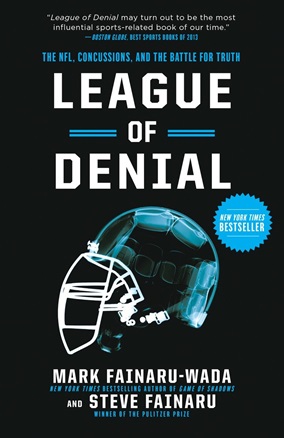Description
NEW YORK TIMES BESTSELLER • A “meticulously documented and endlessly chilling” (The New York Times) exploration of the NFL’s decades-long attempt to deny and cover up mounting evidence connecting football and brain damage.
“A first-rate piece of reporting [that] adds crucial detail, texture, and news to the concussion story, which despite the NFL’s best efforts, isn’t going away.”—Time
ONE OF THE BEST BOOKS OF THE YEAR: The Boston Globe, NPR
“Professional football players do not sustain frequent repetitive blows to the brain on a regular basis.” So concluded the National Football League in a December 2005 scientific paper on concussions in America’s most popular sport. That judgment, implausible even to a casual fan, also contradicted the opinion of a growing cadre of neuroscientists who worked in vain to convince the NFL that it was facing a deadly new scourge: chronic traumatic encephalopathy (CTE), a chronic brain disease that was driving an alarming number of players—including some of the all-time greats—to madness.
Everyone knows that football is violent and dangerous. But what the players who built the NFL into a $10 billion industry didn’t know—and what the league sought to shield from them—is that no amount of padding could protect the human brain from the force generated by modern football.
In League of Denial, award-winning ESPN investigative reporters Mark Fainaru-Wada and Steve Fainaru expose the public health crisis that emerged from the playing fields and examine how the league used its power and resources to attack independent scientists and elevate its own flawed research—a campaign with echoes of Big Tobacco’s fight to deny the connection between smoking and lung cancer. They chronicle the tragic fates of players like Hall of Fame Pittsburgh Steelers center Mike Webster, who was so disturbed at the time of his death he fantasized about shooting NFL executives, and former San Diego Chargers great Junior Seau, whose diseased brain became the target of a scientific battle between researchers and the NFL.
Based on exclusive interviews, previously undisclosed documents, and private e-mails, League of Denial is the story of what the NFL knew and when it knew it—questions at the heart of a crisis that threatens American football—and of the battle for the sport’s future.
About the Author
Mark Fainaru-Wada is an investigative reporter for the San Francisco Chronicle. After fifteen months of covering steroid use in sports, in December 2004 they reported in the Chronicle on the secret grand jury testimony of pro baseball players Jason Giambi and Barry Bonds, making headlines around the world. Fainaru-Wada and Lance Williams won the Dick Schaap Excellence in Sports Journalism Award, the George Polk Award, and the White House Correspondents’ Association’s Edgar A. Poe Award for their reporting.
Lance Williams and Mark Fainaru-Wada are reporters on the investigative team at the San Francisco Chronicle. Together, they broke a series of exclusive stories on the BALCO scandal and earned a string of national honors, including the George Polk Award, The Edgar A. Poe Award of the White House Correspondents’ Association, The Dick Schaap Excellence in Sports Journalism Award and The Associated Press Sports Editors award for investigative reporting.
Williams has written on subjects including the California cocaine trade, Oakland’s Black Panther Party and the career of San Francisco mayor and political power-broker Willie Brown. His journalism also has been honored with: the Gerald Loeb Award for financial writing; the California Associated Press’ Fairbanks Award for public service; and, on three occasions, the Center for California Studies' California Journalism Award for political reporting. He was the Society of Professional Journalists’ Northern California Journalist of the Year in 1999.
Born in Ohio, he graduated from Brown University and the University of California-Berkeley and attended University College, London, U.K. Before joining the Chronicle, he worked as a reporter at the Hayward Daily Review, the Oakland Tribune, and the San Francisco Examiner. He was a University of Michigan Journalism Fellow in 1986-87.
